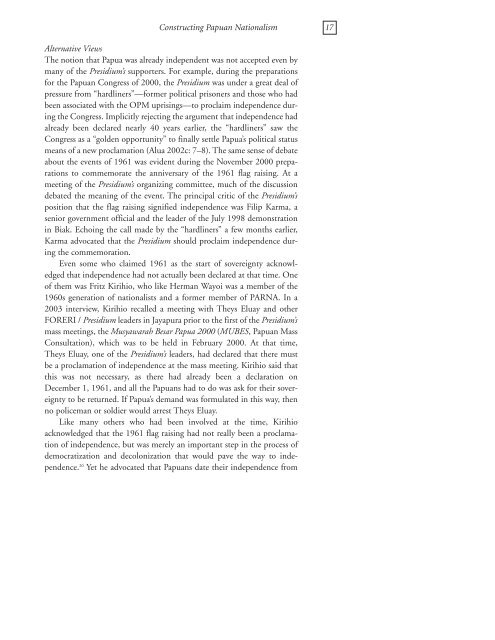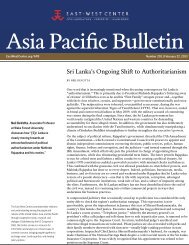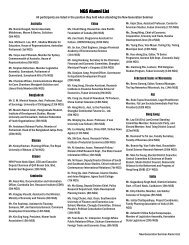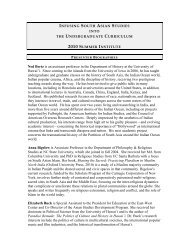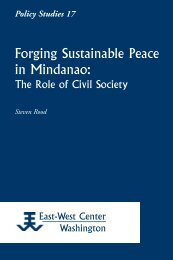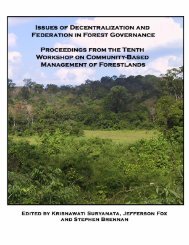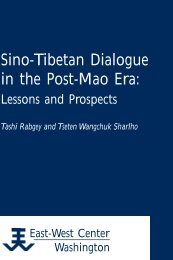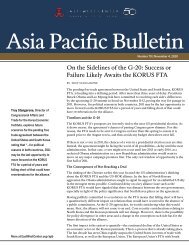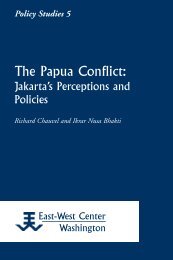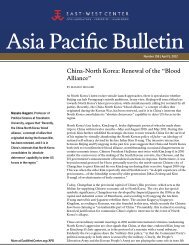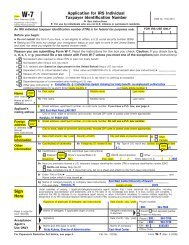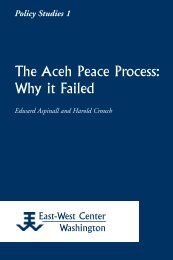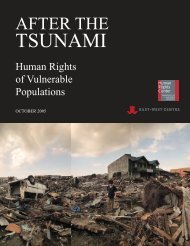Constructing Papuan Nationalism: History, Ethnicity ... - ScholarSpace
Constructing Papuan Nationalism: History, Ethnicity ... - ScholarSpace
Constructing Papuan Nationalism: History, Ethnicity ... - ScholarSpace
- No tags were found...
Create successful ePaper yourself
Turn your PDF publications into a flip-book with our unique Google optimized e-Paper software.
<strong>Constructing</strong> <strong>Papuan</strong> <strong>Nationalism</strong> 17Alternative ViewsThe notion that Papua was already independent was not accepted even bymany of the Presidium’s supporters. For example, during the preparationsfor the <strong>Papuan</strong> Congress of 2000, the Presidium was under a great deal ofpressure from “hardliners”—former political prisoners and those who hadbeen associated with the OPM uprisings—to proclaim independence duringthe Congress. Implicitly rejecting the argument that independence hadalready been declared nearly 40 years earlier, the “hardliners” saw theCongress as a “golden opportunity” to finally settle Papua’s political statusmeans of a new proclamation (Alua 2002c: 7–8). The same sense of debateabout the events of 1961 was evident during the November 2000 preparationsto commemorate the anniversary of the 1961 flag raising. At ameeting of the Presidium’s organizing committee, much of the discussiondebated the meaning of the event. The principal critic of the Presidium’sposition that the flag raising signified independence was Filip Karma, asenior government official and the leader of the July 1998 demonstrationin Biak. Echoing the call made by the “hardliners” a few months earlier,Karma advocated that the Presidium should proclaim independence duringthe commemoration.Even some who claimed 1961 as the start of sovereignty acknowledgedthat independence had not actually been declared at that time. Oneof them was Fritz Kirihio, who like Herman Wayoi was a member of the1960s generation of nationalists and a former member of PARNA. In a2003 interview, Kirihio recalled a meeting with Theys Eluay and otherFORERI / Presidium leaders in Jayapura prior to the first of the Presidium’smass meetings, the Musyawarah Besar Papua 2000 (MUBES, <strong>Papuan</strong> MassConsultation), which was to be held in February 2000. At that time,Theys Eluay, one of the Presidium’s leaders, had declared that there mustbe a proclamation of independence at the mass meeting. Kirihio said thatthis was not necessary, as there had already been a declaration onDecember 1, 1961, and all the <strong>Papuan</strong>s had to do was ask for their sovereigntyto be returned. If Papua’s demand was formulated in this way, thenno policeman or soldier would arrest Theys Eluay.Like many others who had been involved at the time, Kirihioacknowledged that the 1961 flag raising had not really been a proclamationof independence, but was merely an important step in the process ofdemocratization and decolonization that would pave the way to independence.20 Yet he advocated that <strong>Papuan</strong>s date their independence from


